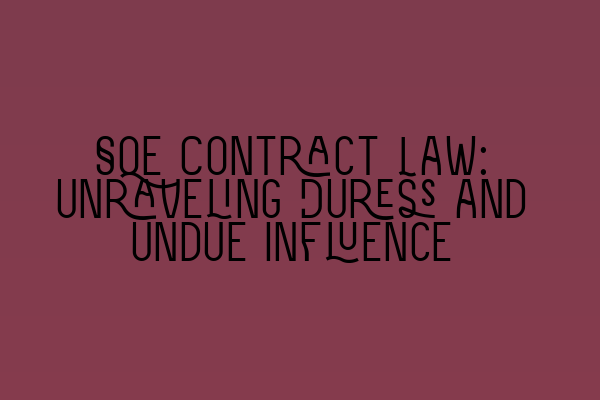SQE Contract Law: Unraveling Duress and Undue Influence
Welcome to SQE Contract Law, where we dive into the intricacies of legal concepts and provide insightful analysis. In this article, we will unravel the complex topics of duress and undue influence, shedding light on their importance in contract law. Understanding these concepts is crucial for both solicitors and individuals navigating contractual agreements.
But first, let’s clarify some basics. Duress refers to a situation where one party is forced, either physically or psychologically, to enter into a contract against their will. Undue influence, on the other hand, occurs when one party takes advantage of their position of power to manipulate or coerce the other party into entering into a contract. These concepts are significant because they challenge the principle of contractual freedom and raise concerns about the fairness and validity of the agreement.
Factors that contribute to duress can vary widely, ranging from physical threats to economic pressure or emotional manipulation. It’s crucial for solicitors to identify and assess these factors to determine whether a contract has been entered into involuntarily. By doing so, solicitors can ensure that their clients are protected and that justice is upheld.
Similarly, undue influence can occur when a person with authority or influence over another person exploits their position to coerce the weaker party into agreeing to a contract. This can manifest in various forms, such as the abuse of a fiduciary relationship or the exertion of emotional control. Solicitors must diligently scrutinize contracts for signs of undue influence to safeguard their clients’ interests.
Now that we’ve established the significance of duress and undue influence in contract law, let’s take a closer look at how they are typically assessed in legal proceedings. When dealing with duress, courts typically consider factors such as the nature and degree of the pressure applied, the vulnerability of the victim, and whether there were alternatives available to the victim. These factors help determine whether the contract should be voidable due to the presence of duress.
Similarly, courts evaluate undue influence by examining the nature of the relationship between the parties involved, the extent of the influence exerted, and the consequences suffered by the weaker party. If it is determined that undue influence played a role in the creation of the contract, the courts may declare it voidable as well.
It’s important to note that the burden of proof lies with the party claiming duress or undue influence. Solicitors play a crucial role in assisting their clients in gathering evidence, identifying legal precedents, and presenting a compelling case to substantiate these claims.
Aspiring solicitors must familiarize themselves with these concepts as part of their legal education. By understanding duress and undue influence, they can provide valuable counsel to clients and ensure fairness and justice in contractual matters. If you’re an aspiring solicitor looking for mentorship and guidance in the legal field, check out our related article on Mentorship for Aspiring Solicitors: Nurturing Talent in the Legal Field.
Legal challenges can often arise when navigating the complexities of the legal system. To gain further insights into overcoming such hurdles, we recommend reading our article on Legal Challenges and Pitfalls: Navigating the Complexities of the Legal System.
For individuals interested in pursuing a career as a solicitor, the Graduate Diploma in Law (GDL) is an important pathway to consider. Learn more about the GDL and its significance in our article on The GDL (Graduate Diploma in Law): A Pathway to Becoming a Solicitor.
Mastering the solicitor’s path requires meticulous preparation and a comprehensive understanding of legal principles. To prepare for the journey ahead, take a look at our article on Mastering the Solicitor’s Path: Prepare for the Journey Ahead.
Finally, becoming a solicitor offers numerous benefits, both personally and professionally. To explore the rewarding aspects of this career choice, check out our article on The Benefits of Becoming a Solicitor: A Rewarding Career.
In conclusion, duress and undue influence are critical elements of contract law that challenge the notion of contractual freedom. Solicitors must navigate these concepts with precision and care to ensure fairness and justice prevail. Understanding the factors that contribute to duress and undue influence, as well as the legal assessments involved, is vital for aspiring solicitors and individuals engaged in contractual agreements. By unravelling these complex concepts, we can safeguard the integrity of contracts and protect the interests of all parties involved.
